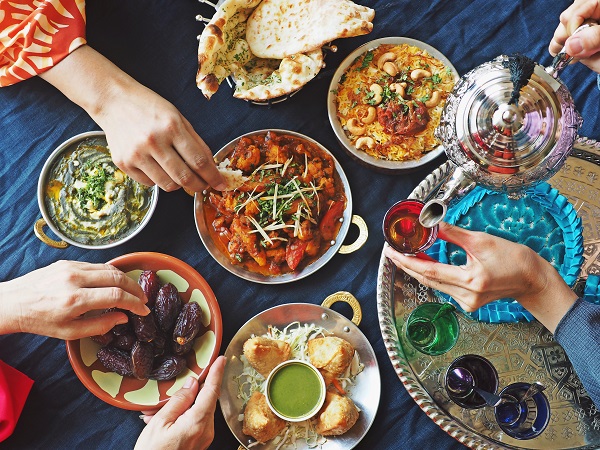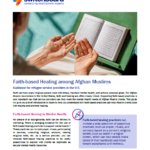This blog post includes contributions from Eugenia Gusev, Technical Advisor for Food Security and Agriculture, IRC; Gul Hussain Shinwari, Sr. Program Officer, Afghan Placement & Assistance, IRC; members of IRC’s Food Security Working Group; and Farid Saydee, Independent Consultant, Language Mentors International.
During the holy month of Ramadan, many Muslims fast, or refrain from eating or drinking, from sunset until sundown. This year, Ramadan occurs from approximately April 2nd through May 2nd. Many newly arriving Afghan Muslims are still living in temporary accommodation with limited cooking appliances, which will hinder their ability to prepare traditional foods. This blog post suggests ways that refugee service providers can help meet the food needs of Afghan clients who are observing Ramadan while living in temporary housing.
Planning for Ramadan Food Needs
While it may not be possible for you to supply all of the meals, ingredients, or cooking equipment clients may want during Ramadan, you can try to procure a few of the desired options to make this 30-day period more comfortable for newly arrived Afghans while they await the transition to permanent housing. Here are a few steps to take in advance:
- Discuss clients’ needs and preferences related to food during Ramadan
- Assess cooking options in temporary housing
- Assess/Identify partners who can provide food, ingredients, or safe, hotel-allowable cooking appliances (see below for suggestions)
- Leverage existing funding to purchase and deliver needed food items
Note: in addition to preparing for food needs, it is also a good idea to inform schools about the month of Ramadan and request they excuse fasting students from gym class/physical education or make this activity optional for them.
Culturally Appropriate Foods
For Afghans , culturally appropriate food items and ingredients for Ramadan include basmati rice, dates, halal chicken and halal beef, tea, flat bread, kidney beans, chickpeas, eggs, milk, cooking oil, sugar, wheat flour, and chickpea flour. For a longer list, see Switchboard’s Checklist: Traditional Afghan Ingredients for Ramadan.
If not all of these items can be provided, it’s recommended to provide at least rice, dates, halal meat, tea, and flat bread.
Traditional Afghan Dishes Served During Ramadan
- Shorwa (soup)
- Du piyaza (lamb stewed in an onion-based sauce)
- Qorma e murgh (chicken curry)
- Qorma e goshfand (mutton curry)
- Mantu (steamed meat and onion stuffed dumplings)
- Qabuli pulaw (rice with fried raisins, chopped carrots, and lamb)
- Shorma beray bolani (fried or baked flat bread with a vegetable filling)
- Pakora (thin slices of potato dipped in a chickpea flour batter and deep fried)
- Bolani (pan-fried turnover or flat bread filled with chopped scallions, pumpkin, or potatoes)
- Aushak (vegetable dumplings)
- Khurma (dates, fresh fruit, and nuts)
- Sheereeni (sweet dishes and desserts)
Afghan community members can provide suggestions for sources of additional ingredients, such as pre-chopped carrots to make Qabuli pulaw, or egg roll wrappers/uncooked tortillas to prepare Bolani, Aushak, and Mantu. In Afghanistan, people usually prepare these items at home, which can be very time-consuming. However, these ingredients are easily found in grocery stores in the U.S.
Most traditional meals are cooked using a combination of stovetop and oven. In temporary housing situations, however, some can be prepared using a microwave or a slow cooker. Keep in mind that not all electric appliances are safe for hotel use; discuss with temporary housing partners ahead of time.
Also discuss which utensils your clients require ahead of time. These may include mixing bowls, knives for cutting vegetables, cutting boards, serving plates, serving spoons, pots, and a flat pan (tawa) for cooking traditional breads.
Connecting with Partners
Consider reaching out to food and community partners to help support traditional food access to clients. Organizations and companies that may be able to support include:
- Local mosques and Muslim community organizations – Most mosques provide food during Ramadan to participants to break their fast and then perform the evening/dusk prayer.
- Islamic Relief USA – Islamic Relief offers Ramadan food aid including items such as rice, lentils, oil, sugar, canned fish or meat, and dates.
- ICNA Relief USA – ICNA offers Ramadan food boxes containing items such as oil, beans, pasta, sauce, rice, flour, tea, and sugar.
- Shef – This for-profit company connects with local cooks to sell authentic meals in Austin, Houston, Seattle, Boston, Chicago and the Bay Area.
Want to Learn More?
- Who are the Afghan Newcomers? – This short video series offers an introduction to cultural awareness for providers supporting Afghan newcomers to the U.S.
- Afghan Cultural Backgrounder – This resource from Cultural Orientation Resource Exchange (CORE) contains historical, political, and cultural information about Afghanistan.









